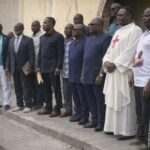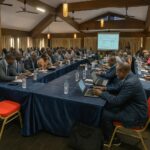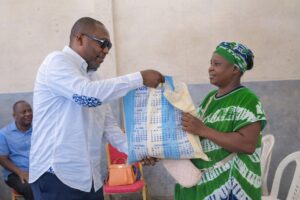Date confirmed for the second ordinary congress
The National Council of the Pan-African Union for Social Democracy, better known by its French acronym Upads, ended its fifth session in Brazzaville with a single headline decision: the party’s second ordinary congress will run from 12 to 14 November 2025 in the capital.
- Date confirmed for the second ordinary congress
- Internal roadmap crafted in Brazzaville
- Financing the gathering through collective effort
- Commission set for departmental congresses
- Statutes, doctrine and strategic orientation under review
- Emphasis on youth and women
- Transparency call for local conventions
- Re-engagement of sanctioned members
- Campaign momentum and mobilisation
- Refining social action priorities
- Leadership renewal expectations
- Meeting logistical challenges
- Building on past experience
- Messaging to the broader public
- A timetable welcomed by militants
- Shared responsibility for success
Rapporteur Romaric Sidoine Moukoukou delivered the announcement at the close of the council meeting on 31 August, describing the upcoming gathering as a key step toward electing fresh leadership and giving members a renewed strategic compass for the coming years.
Internal roadmap crafted in Brazzaville
Councillors drafted a roadmap that blends organisational housekeeping with forward-looking ideas. Suggestions include extending the ongoing membership drive, deepening grassroots enrolment, and modernising internal structures so local sections can channel ideas upward with greater speed and clarity.
The blueprint also calls for systematic training of cadres and militants. Delegates argue that better-equipped activists will translate policy proposals into persuasive messages during national conversations, ensuring the congress resolutions resonate well beyond party walls.
Financing the gathering through collective effort
In his closing remarks, First Secretary Pascal Tsaty-Mabiala underlined the financial dimension. He urged militants to respect the contribution grid issued by the national secretariat, calling the measure an “imperative condition” for participation in departmental and national congresses.
According to Tsaty-Mabiala, fulfilling these obligations is less a levy and more a joint investment. By sharing costs proportionally, each branch demonstrates ownership of the event and signals that prudent financial culture is vital for any political organisation hoping to endure.
Commission set for departmental congresses
Delegates constituted an organising commission to supervise departmental congresses slated for 27-28 September 2025. Those local gatherings will elect delegates who, in turn, will head to Brazzaville in November, ensuring representation mirrors the party’s territorial spread.
Members revisited the supporting documents expected to frame debate at every stage. Draft amendments to the statutes, revisions of internal rules, programme adjustments, and doctrinal fine-tuning are on the table, providing a structured yet open agenda for policy discussion.
Statutes, doctrine and strategic orientation under review
Councillors highlighted several focal points. Proposed statute changes address organisational flexibility; revised internal regulations target clarity on responsibilities; programme updates seek to align ambitions with emerging social realities.
A thematic paper on strategic orientations will guide dialogues on the party’s role in Congo-Brazzaville’s political landscape. Delegates believe that clear direction on socio-economic priorities can attract new sympathisers while strengthening solidarity among long-term members.
Emphasis on youth and women
Tsaty-Mabiala reiterated a pledge made at the start of his mandate: youth and women deserve strategic positioning inside Upads structures. He framed representation not as mere symbolism but as the lifeline of organisational vitality.
The first secretary encouraged local delegations to identify talented young activists and experienced women leaders ahead of the September congresses, arguing that a diverse delegate pool sharpens debate and keeps policy grounded in day-to-day realities.
Transparency call for local conventions
When discussing the upcoming departmental meetings, Tsaty-Mabiala voiced a preference for full transparency. He asked organisers to guarantee open procedures so that outcomes reflect genuine grassroots sentiment.
Clear rules, published timelines and verifiable voting methods were cited as tools to build confidence. Delegates nodded in agreement, recognising that the legitimacy earned locally will flow upward, bolstering acceptance of November’s national verdicts.
Re-engagement of sanctioned members
The first secretary extended an olive branch to council members currently under sanction, inviting them to take part in the November congress. Party statutes grant only that forum the authority to lift disciplinary measures, making attendance a practical prerequisite for full rehabilitation.
Observers inside the hall described the gesture as an inclusive move aimed at consolidating unity ahead of decisive votes on leadership and doctrine.
Campaign momentum and mobilisation
Beyond structural issues, the National Council urged provincial teams to circulate accurate information, ensuring militants in every district understand the timeline, the procedural rules and the issues at stake.
Delegates were tasked with nurturing momentum by holding community-level forums, circulating explanatory leaflets, and encouraging members to finalise enrolment well before September, thereby avoiding last-minute bottlenecks.
Refining social action priorities
Another agenda item centred on Upads’ social action. Councillors considered reorganising categorical signals—internal labels used to tailor outreach to specific societal segments.
Participants argued that clearer signals could sharpen policy proposals on education, health and employment. Such focus, they believe, would make the party’s future campaign messages both precise and persuasive.
Leadership renewal expectations
The November congress is mandated to elect new governing bodies. Several council members noted that orderly succession demonstrates institutional maturity, an asset for any party seeking to expand its national footprint.
Although no names were floated during the session, the structured calendar offers ample time for aspirants to present platforms, fostering a competitive yet collegial atmosphere.
Meeting logistical challenges
Organisers acknowledged logistical challenges inherent in convening hundreds of delegates in Brazzaville. Accommodation, transport and health protocols must be mapped early to avoid disruptions.
The council expressed confidence that steady fundraising, detailed scheduling and close coordination with municipal authorities will keep preparations on track.
Building on past experience
While this will be only the second ordinary congress, councillors said lessons from previous gatherings—ordinary or extraordinary—offer a useful template.
They cited the value of punctual document distribution, disciplined timekeeping during debates and consensus-based voting procedures as practices worth retaining to safeguard productivity.
Messaging to the broader public
Upads leaders recognise that the November congress will draw attention well beyond the party’s ranks. Clear, consistent messaging aims to present the gathering as a constructive exercise in participatory democracy.
They plan to release periodic briefings, offering journalists timely updates while avoiding speculation, emphasising that an informed public can better appreciate the party’s policy debates.
A timetable welcomed by militants
According to Romaric Sidoine Moukoukou, early reaction from regional branches has been positive. Militants reportedly welcome the fixed timetable, seeing it as a sign that the party is committed to proactive planning.
He added that enthusiasm has already translated into increased membership inquiries, suggesting the congress announcement is acting as a rallying point.
Shared responsibility for success
In his closing appeal, Tsaty-Mabiala reminded attendees that both collective organisation and individual commitment underpin success. “Let us each take the necessary steps, together and separately, to make this long-awaited event a triumph,” he said, drawing applause from the hall.
With that exhortation, councillors left Brazzaville’s meeting venue, pledging to convert plans into action as the countdown to November 2025 officially begins.






















